- Home
- Alex Segura
Miami Midnight
Miami Midnight Read online
Table of Contents
Title Page
Also by Alex Segura
Quotes
Dedication
PART I - I LOST YOU
BIG EXIT
CHAPTER ONE
MY MOTHER THE WAR
CHAPTER TWO
CHAPTER THREE
CHAPTER FOUR
CHAPTER FIVE
CHAPTER SIX
CHAPTER SEVEN
CHAPTER EIGHT
PART II - 'ROUND MIDNIGHT
CHAPTER NINE
CHAPTER TEN
CHAPTER ELEVEN
CHAPTER TWELVE
FEAR THE FUTURE
CHAPTER THIRTEEN
CHAPTER FOURTEEN
CHAPTER FIFTEEN
CHAPTER SIXTEEN
JEZEBEL
CHAPTER SEVENTEEN
PART III - MOTION SICKNESS
CHAPTER EIGHTEEN
CHAPTER NINETEEN
CHAPTER TWENTY
CHAPTER TWENTY-ONE
CHAPTER TWENTY-TWO
THE GOOD THAT WON’T COME OUT
CHAPTER TWENTY-THREE
CHAPTER TWENTY-FOUR
CHAPTER TWENTY-FIVE
CHAPTER TWENTY-SIX
CHAPTER TWENTY-SEVEN
CHAPTER TWENTY-EIGHT
SPIRIT IN THE DARK
CHAPTER TWENTY-NINE
CHAPTER THIRTY
CHAPTER THIRTY-ONE
CHAPTER THIRTY-TWO
CHAPTER THIRTY-THREE
CHAPTER THIRTY-FOUR
PART IV - SERPENTS
CHAPTER THIRTY-FIVE
DON’T EXPLAIN
CHAPTER THIRTY-SIX
CHAPTER THIRTY-SEVEN
CHAPTER THIRTY-EIGHT
CHAPTER THIRTY-NINE
CHAPTER FORTY
CHAPTER FORTY-ONE
CHAPTER FORTY-TWO
CHAPTER FORTY-THREE
ACKNOWLEDGEMENTS
Copyright Notice
Silent City
Down the Darkest Street
Dangerous Ends
Blackout
“When you get a cat to catch the mice in your kitchen, you can’t expect it to ignore the rats in the cellar.”
― Philip Kerr, March Violets
“The past was worth remembering and knowing in its own right. It was not behind us, never truly behind us, but under us, holding us up, a foundation for all that was to come and everything that had ever been.”
― Laura Lippman, In a Strange City
For Eva, Guillermo, and Lucia. My heart.
January 1, 1984
“YOU DON’T WANT to go in there, Osvaldito.”
The deputy’s words seemed to float in the air around the entrance to the room, like fading smoke. As Detective Osvaldo Valdez approached, the deputy backed away. Osvaldo knew he had little choice in the matter. He had to walk into the dim, dank hotel room that was already being cordoned off by yellow tape. The stuffy hallway, reeking of cheap cologne and sweat, had been cramped with uniforms and a forensics unit, but the room itself was empty—aside from the body splayed out near the far window.
The woman—late thirties, skinny, brunette, hair cut short but not boyish—lay on the floor at an odd angle. Her head was twisted up, as if trying to look out the dirty, smudged window—the only source of natural light in the dingy hotel room.
Osvaldo did his best to keep his footfalls light. He’d been on the Miami Homicide team for a little over six months. His partner, Tino Vigil, was catching another body downtown. That left Osvaldo here in Overtown, feeling itchy and hot in the decrepit Hampton House Hotel, checking on a body. The owner had called it in—complaining that the man who’d rented the room had bailed, leaving him fifty bucks short. He’d prattled on about the noise, too, the screaming. More than your usual Overtown kerfuffle. More than your usual New Year’s Eve partying, too. Serious wailing. Thuds. Boom-boom-crash. Real loud, then dead quiet. Too quiet.
Osvaldo motioned over his shoulder for one of the uniformed officers, a kid named Mosher, to come in behind him.
“Don’t touch anything yet, okay?” Osvaldo said. “I wanna get a feel for it first.”
He stepped further into the room, his arms out a bit, palms open, as if trying to catch something, a sign of what had happened there. Static. Nothing.
But then, something, as he stepped closer, and a sliver of the New Year’s Day sun fell on the woman’s face, bruised and bloodied, illuminating the dark, purple marks around her neck, scratches streaking down toward her collarbone. Past the cuts and injuries, Osvaldo recognized something. A flicker of familiarity snapped at him.
“Fuck,” he said, his eyes scanning the woman’s face once more. Not just a woman. Not just a Jane Doe. Not anymore.
He wheeled around. He felt himself heat up, a sheen of sweat spread over him, prickling his back, then his face. This can’t be right. But he knew it was true. Mosher, who had been shadowing his movements, jerked back, surprised by Osvaldo’s quick pivot. The detective looked at the younger man, with his trimmed beard and eager eyes. Those will fade soon, Osvaldo thought. You’ll become a zombie, just like the rest of us.
The ones who survive.
“Get everyone out of here except essential personnel,” Osvaldo said, his tone flat, eyes locked on Mosher, who nodded. “And then get Carlos Broche on the phone. Fast.”
March 15, 2018
ISLEÑO NOVO PULLED his small suitcase from the overhead bin and waited for the people in front of him to disembark. The Newark-to-Miami flight had been pleasant enough. He’d even had an empty seat between him and the lady at the window. That was best, Novo thought. He didn’t do well with small talk.
As the group filtered off the plane and through the gate into Miami International Airport, Novo veered right as the majority went left, toward Baggage Claim. He pulled a small black burner phone out of his coat pocket and dialed the number from memory. He already felt the tropical heat coating him, like a brush soaked in oil. He hated Miami.
“Aquí estoy,” Novo said. I’m here.
The voice on the other line was flat and muted. Their exchange was brief. Numbers and a few words.
Novo closed the phone and tossed it into the first trash bin he passed on his way out of the airport. He’d memorized the address. The people who had paid for him to fly down to this festering hellhole would have a car waiting outside. The sign would read “Batista.” He’d get in the forgettable black sedan and nod at the driver. On the way to meet his bosses—short-term bosses; Novo worked for himself, mostly—he’d get his uniform. His suit.
It was not a role Novo had sought, but he had to take it. His partner, Darien, back in Union City, was in awe when Novo told him. Impressed.
“They must really respect you, Isleño, to give you a job like this.”
They’d equip him with a silencer and give him his marching orders. All those things were easy enough to transport. To get the job done, close-range. And Novo only worked up-close these days. His time as a long-range sniper, picking off Castro’s goons in the mountains, and, later, from within Havana, trying to shoot his way back to freedom, was over. He was a legitimate businessman. Older, respected. Sometimes, when he laid his head down on his pillow and turned off the lights, he could see himself living a life purely financed by his “legitimate” earnings—the bodega on Central Avenue, the hardware store a few blocks north—but then he’d laugh, because he knew that day would never come. No matter how carefully Novo cleaned his money, or how much he scaled back his “real” work, he’d never be out of the game. A fighter too punch-drunk to know when to stop.
And this assignment was just too good to ignore. It was one he’d savor.
So, he’d do as he was told. He’d put on the long black coat and hat.
He’d load the silencer. Then he’d make his way toward his target. He’d find the perfect time to sidle up next to the man. And, if he could, before the trigger was pulled, he’d whisper the words he’d been asked to say:
“The DeCalvacantes say hello.”
Then he’d kill Pete Fernandez.
“WHAT ARE YOU working on now?” she asked, her tone relaxed, peaceful. “A new case?”
“I told you, I’m retired. I’m out of that game. For good this time.”
Pete Fernandez squirmed on the long, leather couch as he faced his therapist, Allie Kaplan. Her posture was confident, present. Her demeanor was polished but casual as she sat across from Pete. Kaplan was in her mid-forties, with long black hair. She was well built with smooth features. She looked comfortable and relaxed, two things Pete hadn’t experienced in what felt like centuries.
His body was in shambles. His left shin ached if the temperature dipped below seventy degrees—the spot where mafia captain Vincent Salerno had slammed his heel, before he left Pete for dead. Pete’s jaw clicked if he yawned or laughed too hard—residual damage from too many punches to the chin. The pale white skin of his of his chest looked like it had been splattered with dark purple paint, a cornucopia of bruises and cuts healing at different speeds. That was the superficial stuff. Some nights, before sleep, Pete would feel the jolt—the first push from the first shot that entered his body. His back would tighten and his legs would spasm, as if bracing for another. Another shot to put him down for good.
Pete knew he was lucky to be alive. To have come back to life. For a minute or two, he’d been gone—the bullet holes in his chest had done him in, the bruises and cuts and broken bones combined with blood loss to write the final lines in Pete’s story. But somehow, that wasn’t enough. An FBI agent named Dave Sternbergh got to him. He’d been sitting in his unmarked car, waiting for his partner, Amanda Chopp, to return. He’d seen a suspicious figure follow Amanda into Pete’s Spring Valley, New York office. Sternbergh pursued slowly. Faster, once he heard the gunshots. Even faster when he saw his partner of seven years dead on the floor and Pete Fernandez bleeding out a few feet away.
It’d been close. Pete would never fully recover. Months of physical therapy helped fix the external problems, fix them enough so he could live. But the flies buzzing around in his head were another matter. The white noise that coated every thought, every action. That’s why he was here, in a small office buried in a nondescript building off Coral Way, sharing his deepest-darkest with a therapist who didn’t really seem to buy Pete’s stump speech: that he was fine. He was happy to be alive. He was retired. He was doing great.
Because it wasn’t true.
“You keep saying that,” she said. “But what does that mean?”
“It means, well, I’m out of the game,” Pete said.
“Are you? You’ve done things that say you are out of the game,” she said, a humorless, polite smile on her face. “But then you’ve done other things that say the opposite, I think.”
“Like what?” Pete asked. “I mean, I’m barely a private investigator anymore—I don’t even carry my gun. So what, then?”
“The self-defense training, for one.”
“I think my … my life experience has shown me it’d be good to know how to defend myself.”
“I think that’s valid.”
“I was dead, clinically dead,” Pete said, running a hand through his hair. “I survived. I had to figure out how to … how to never be in that situation again. How to never find myself just relying on pure luck and my wits to survive.”
“How do you feel now?”
“I feel stronger,” Pete said. “I’m not scared. The aikido and gym time have been a good release, I guess. A good way to get my mind off of things.”
“But wouldn’t you think—and I’m just raising the question—that training in this way suggests you’re ... preparing for something?”
“No, not at all,” Pete said. “I’m just working at the bookstore, and that gets me enough to live. It’s not the most exciting thing, but—”
“But it’s enough?” she asked. “Would you say that?”
“Yes,” Pete said. “It’s peaceful. I’ve survived enough. I saw ... I was—”
“When you got shot?” she asked. “What did you see?”
“I saw a blackness,” Pete said. “A void. An endless nothing .... Then I was back, like I’d been jarred awake from a deep, dark dream that was spreading out in all directions, like some kind of fast-moving oil spill. Then I was awake, and there were faces around me and I was ... It hurt so much. I was hurting everywhere, like I’d never felt—”
“But you’ve made so much progress,” she said, leaning forward. “I mean, look at you. I wouldn’t be able to tell—”
Pete winced. He knew she was lying. He had a thick beard now, to hide the scrapes and bruising on his face as best he could. If he walked too fast, he limped slightly. He had trouble lifting his arms above his head. And he would never be able to try out for the Dolphins. But, yes. He was alive. He had to remind himself of that.
“You don’t have to tell me,” Pete said. “I’m grateful to be alive.”
“It’s okay if you’re not.”
Pete looked up at Allie. Her expression was blank, waiting.
“What?”
“It’s okay to resent being alive, is what I’m saying. Maybe part of you wanted to die that day.”
Pete shook his head. “That’s insane.”
“Is it?” she said. “Your life—at least the last five years—has involved people gunning for you, friends dying, extreme physical and mental trauma, and lots of tragedy and infamy. You’ve done a lot of good, but I imagine that was as exhausting as life can get, right? To what end? You’re working at a bookstore, your body is a mess, you’re single, and you have no real family or friends to speak of.”
“Wow, doc,” Pete said, a dry laugh escaping his mouth. “And here I thought therapy was supposed to make me feel better.”
“It is, eventually. But first, we need to look at things as they are, not just pretend it’s great. And I think you’re doing the latter. Pretending. Resigning yourself. But I think—and look, you can tell me to go to hell if you want—I think you must have learned something over the last few years, right? Realized you were good at some part of what was going on?”
“So?” Pete asked. “That little flicker of hope should keep me on the same track?”
“No,” Allie said. “But it’s something. It’s more than just being stuck in a self-inflicted purgatory. You seemed to—on some level—like what you were doing. But for whatever reason, you chose not to fully embrace it. You just bumbled through it, barely surviving. It had consequences. But now it feels like you’re preparing for something, while also denying that anything’s coming.”
Pete crossed his arms and looked away, not responding.
Allie pressed on. “Pete, you’re a good man, a good person. I know that much from just sitting here and talking to you every week for the last few months. You’ve made mistakes. Who hasn’t? Maybe the answer to the pain, the plan moving forward, isn’t to shelter yourself from the stuff that’s gone wrong, but to push forward with a clearer idea of what you want. Does that make sense? You’re acting out of fear—and that’s understandable. You almost died. But maybe the answer is to embrace who you are, to get better at that, rather than run from it, you know?”
Pete stood up abruptly.
“I think I have to go,” he said.
“Pete, listen,” Allie said.
“Can you just bill my card?”
“Pete,” she said, grabbing his arm—the contact feeling electric and out of place, like a priest reaching across the confessional. “I know you’re processing a lot. It’s fine if you walk out. Just know I’m around if you need anything, okay? I’m here.”
Pete nodded and moved toward the door, not waiting for Kaplan to continue, his footsteps growing fainter on the faded linoleum floor.<
br />
PETE MOUTHED A silent prayer as he stepped into the restaurant’s foyer. Le Chic, a cozy eatery in the trendy Wynwood area, specialized in gussied-up comfort food. He could already feel the vibrations from the music blasting inside—Black Eyed Peas’ obnoxious earworm, “Let’s Get It Started”—as he reached for the door.
Just make an appearance.
The place was packed, the space felt hot and electric. The small dance floor spilled out into the restaurant’s main dining area, a wave of swerving and gyrating bodes. They’d cleared the tables for the event, but the extra space was barely noticeable. The party felt chaotic, wild—as if it were building to some unknown crescendo, Pete thought. The restaurant was dimly lit, with most of the light coming from around the long, oak bar at the far end of the place and from the multiple TVs perched above the crowd playing the local news.
This might be easier than he’d anticipated. He might just be able to pop in, say hi, and slither out. Then he felt a tug at his arm.
“Thought you were gonna ghost this thing.”
Pete turned around to see Robert Harras, ex-FBI spook with at least half a heart. They’d been through the fire together a few times. Pete considered him a friend. One of the few he still had.
“I told Kathy I’d be here,” Pete said with a weary smile. “Good to see you.”
“Good to see you, too,” the older man said. “You’re looking almost back to normal.”
Pete nodded. They both knew Pete was far from “back to normal”—whatever that meant. Less than a year ago, he was being pushed into a New York emergency room on a gurney, his life signs flat and his blood loss heavy, the victim of a gunshot to the chest from a rogue mobster named Vinnie Salerno. It’d capped off a flurry of events that had left Pete destroyed—literally and figuratively. He’d just returned to New York, his makeshift home at the time, to collect his life and head back to Miami, energized and reinvigorated and, most importantly, eager to carve out a new place for himself in his hometown, surrounded by friends like his investigative partner Kathy Bentley and Harras.
Instead, he died. For a few seconds, at least.

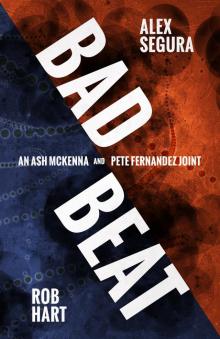 Bad Beat
Bad Beat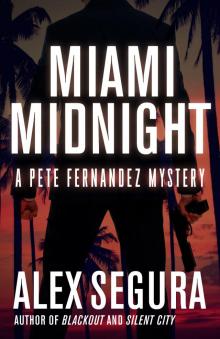 Miami Midnight
Miami Midnight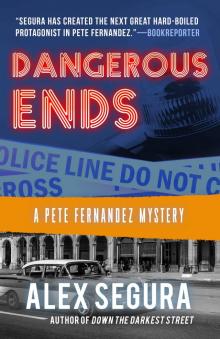 Dangerous Ends
Dangerous Ends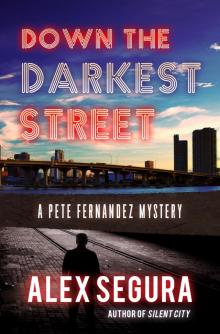 Down the Darkest Street
Down the Darkest Street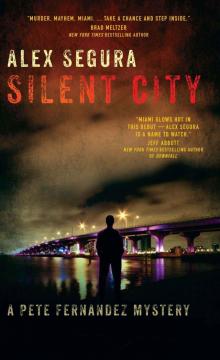 Silent City
Silent City